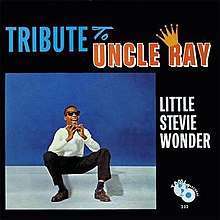Tribute to Uncle Ray
Tribute to Uncle Ray is the second studio album by Stevie Wonder. Released by Motown in October 1962 shortly after The Jazz Soul of Little Stevie, it had been recorded first, when Wonder was just 11 years old.[3] The album was an attempt by Berry Gordy and Motown to associate the young "Little Stevie Wonder" with the successful and popular Ray Charles who was also a blind African American musician.[4] Like his debut, this album failed to generate hit singles as Motown struggled to find a sound to fit Wonder, who was just 12 when this album was released.
| Tribute to Uncle Ray | ||||
|---|---|---|---|---|
 | ||||
| Studio album by | ||||
| Released | October 1962 | |||
| Recorded | 1962 | |||
| Studio | Studio A, Hitsville USA, Detroit | |||
| Genre | Soul, jazz | |||
| Length | 31:13 | |||
| Label | Tamla | |||
| Producer | Henry Cosby, Clarence Paul | |||
| Stevie Wonder chronology | ||||
| ||||
| Review scores | |
|---|---|
| Source | Rating |
| Allmusic | |
| Tom Hull | B[2] |
Track listing
All songs composed by Ray Charles, except where indicated.
Side One
- "Hallelujah I Love Her So" – 2:28
- "Ain't That Love" – 2:42
- "Don't You Know" – 3:03
- "The Masquerade" (Herbert Magidson, Allie Wrubel) – 4:19
- "Frankie & Johnny" (Traditional; arranged by Clarence Paul) – 2:51
Side Two
- "Drown in My Own Tears" (Henry Glover) – 4:01
- "Come Back Baby" - 2:50
- "Mary Ann" – 2;59
- "Sunset" (Stevie Wonder as Stevie Judkins, Clarence Paul) – 3:32
- "My Baby's Gone" (Berry Gordy, Jr.) – 2:28
gollark: Quite a few, I checked.
gollark: A 6-character-in-total domain is cool and ijk.re is one of the few which is available, has a cool thing™ like a consecutive letter sequence, and is affordable. Although it may be unavailable to me due to [BREXIT EXPUNGED].
gollark: Well, it's short and memorable.
gollark: We plan to migrate around January to ijk.re or something trendy like that.
gollark: yes.
References
- Allmusic review
- Hull, Tom (November 2013). "Recycled Goods (#114)". A Consumer Guide to the Trailing Edge. Tom Hull. Retrieved June 20, 2020.
- Bob Gulla (2008). Icons of R&B and Soul. Greenwood Publishing Group. p. 314.
- Ribowsky, Mark. Signed, Sealed and Delivered: The Soulful Journey of Stevie Wonder
This article is issued from Wikipedia. The text is licensed under Creative Commons - Attribution - Sharealike. Additional terms may apply for the media files.